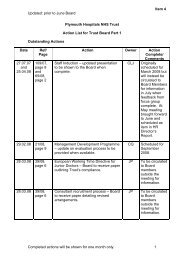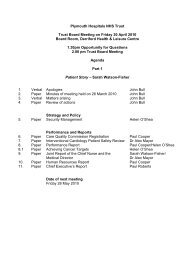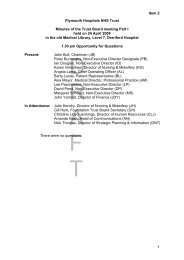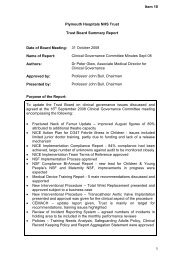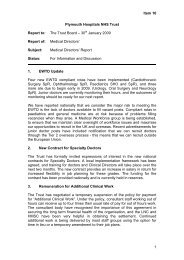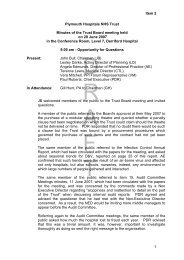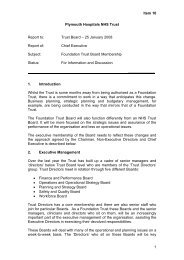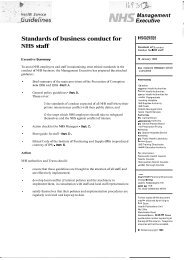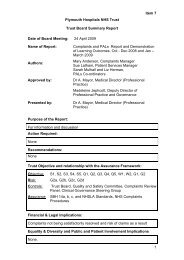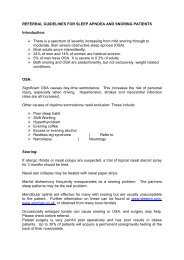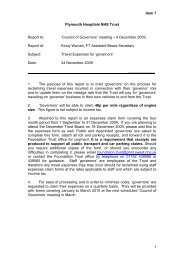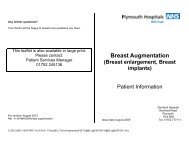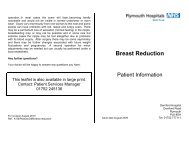Agenda and supporting papers - Plymouth Hospitals NHS Trust
Agenda and supporting papers - Plymouth Hospitals NHS Trust
Agenda and supporting papers - Plymouth Hospitals NHS Trust
Create successful ePaper yourself
Turn your PDF publications into a flip-book with our unique Google optimized e-Paper software.
Item 11<br />
• People with learning disabilities are seen to be a low priority.<br />
• Many healthcare professionals underst<strong>and</strong> little about learning disabilities.<br />
• Many healthcare professionals do not properly consult <strong>and</strong> involve the families <strong>and</strong><br />
carers of people with learning disabilities.<br />
• Many healthcare professionals do not underst<strong>and</strong> the law around capacity <strong>and</strong><br />
consent to treatment.<br />
• Health professionals rely inappropriately on their own estimates of a person’s quality<br />
of life.<br />
• The complaints system within <strong>NHS</strong> services is often ineffectual, time-consuming <strong>and</strong><br />
inaccessible for people with learning disabilities.<br />
(Death by Indifference, Mencap March 2007)<br />
The report claimed that many people with learning disabilities die in hospital due to the<br />
widespread ignorance <strong>and</strong> indifference throughout healthcare services, towards their needs<br />
<strong>and</strong> those of their families <strong>and</strong> carers. Mencap claim that the inequitable service afforded to<br />
those with learning disabilities by hospitals <strong>and</strong> other healthcare services amounts to<br />
institutional discrimination.<br />
Earlier this year, a Confidential Inquiry which reviewed the 247 deaths of people with<br />
Learning Disabilities over a two year period concluded that 42% deaths reviewed were<br />
premature; the reasons for premature deaths being delayed investigations or treatment,<br />
inadequate response to changing needs of individuals <strong>and</strong> inappropriate care for complex<br />
<strong>and</strong> ongoing health needs.<br />
(Confidential Inquiry into the premature deaths of people with Learning Disabilities 2013)<br />
In January 2013, concerns raised through a Coroner’s inquest (heard December 2012; case<br />
two years old), via a Rule 43 letter, were reported to the <strong>Trust</strong> Board. The concerns raised<br />
were in respect of adherence to our own operational policy for managing patients with<br />
Learning Disabilities in hospital; in particular around the support of individuals with consent to<br />
treatments <strong>and</strong> care.<br />
Since then, there have been concerns raised by families of two people with Learning<br />
Disabilities, regarding the lack of consideration of individuals’ complex needs with clinical<br />
decision-making; concerns were raised that staff were not focusing on the needs of<br />
individuals, rather were distracted by their profound disabilities.<br />
As a result of this, a review of the Learning Disabilities Liaison service <strong>and</strong> the <strong>Trust</strong>’s Joint<br />
working protocol (2009) was commenced, at that time by the Acting Director of Nursing.<br />
Following an internal review, a preliminary report was reported to the <strong>Trust</strong> Board in April<br />
(Annex 2).<br />
A Review of the Learning Disabilities Liaison Team with external stakeholders<br />
In order to continue with the good multi-agency working established by the LD Liaison team<br />
<strong>and</strong> to involve (new) local commissioners in the development of the LD Liaison service, a<br />
review involving a range of external stakeholders has been completed. This included:<br />
• Consideration of the outcomes/findings of the internal review of the LD liaison team<br />
structure, working practices/relationships <strong>and</strong> implementation of the Joint operational<br />
protocol.<br />
• Feedback from commissioners, community providers <strong>and</strong> other partners, with respect<br />
to the relationships with the LD liaison team, impact to patients, families <strong>and</strong> other<br />
service providers.



